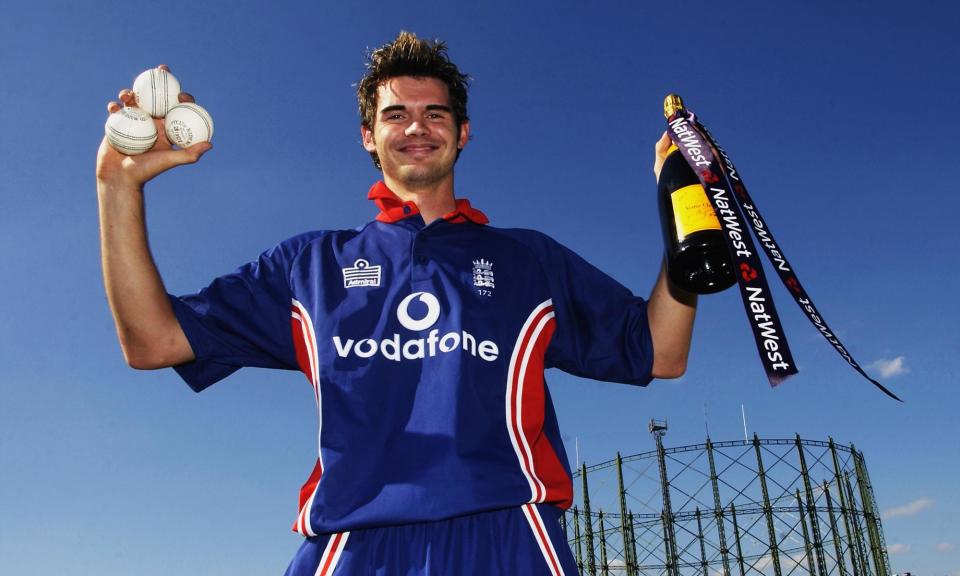The making of Jimmy Anderson: ‘Like a golden nugget falling into your lap’

It all started with a phone call. “It was highly unusual for Val to ring me. In fact I don’t think she ever did before or since, that wasn’t her style at all,” says John Stanworth, recalling how Valerie Brown, the wife of the then captain of Burnley CC, Peter Brown, telephoned one Sunday evening in the late-90s.
It would be a tipoff worth interrupting Antiques Roadshow. A different kind of rare and inestimable commodity was about to be unearthed. “Val just said: ‘The lads and Peter keep talking about this lad, he’s a bowler. Have you heard of James Anderson?’”
“I haven’t actually,” Stanworth replied. She said: “Would you mind coming down to have a look at him?”
Stanworth had played for Lancashire in the 80s and has since held coaching roles for the county and the England and Wales Cricket Board. At the time he was heading up the Lancashire academy. The bolt-from-the-blue phone call convinced him here was a prospect worth investigating.
“We’d just started an under-17s side at Lancs. So I just said to Val: ‘Sure, I’ll come down.’” The whole conversation was aptly understated, even if the lad being discussed did turn out to have a special set of skills he would improve over a very long career. Skills that would make him a nightmare for batters.
Related: Jimmy Anderson’s England exit right decision at right time, insists Rob Key
Valerie’s sons, David and Michael, have been Anderson’s friends since childhood days spent messing around on the boundary edge at Burnley CC. Both became county cricketers. David remembers the circumstances that led to his mum making that fateful call. “Burnley had a lot of senior players leave the club in the mid-90s; we went from having a decent side to losing four or five really established players.”
The Brown boys’ father, Peter, 44 at the time, was then asked to captain the first team. “He said: ‘I’ll do it on the proviso that I can pick some of the kids.’” Peter Brown was given free rein to inject some youth into the first team and the side would nurture plenty of young talent, many of whom went on to play professionally. “Jimmy played his first game a couple of years later during my dad’s last season,” says David.
The teenage Anderson could “bowl absolute jaffas, quick with late swing” but he was raw. The Lancashire leagues were tough and uncompromising. A young Anderson was passed over for trials for Lancashire Under-16s. A different Jimmy would emerge the following spring.
“He would have been 16 and he’d grown a little bit over the winter,” says David. “He came to indoor nets and was bowling noticeably quicker, to the point where you’d be lining up to bat against him and be thinking: ‘I don’t really fancy this!’”
That summer, Anderson began collecting some big scalps in the league. “Jimmy nicked Roger Harper [the former West Indies Test player] off first ball.”
Stanworth was impressed with what he saw of the teenage bowler and invited him to nets at Old Trafford. “He was really polite but hardly ever said a word.”
Despite Anderson having an unconventional action, namely his head falling away at the moment of delivery, Stanworth says he was largely left to bowl in his own way. “He had these incredible natural attributes and was on a sharp upward curve for the next few years.”
In December 2002, Anderson was picked by Nasser Hussain to make his one-day-international debut in Australia when he was 20 years old. A few months later he was razing Pakistan’s top order at the World Cup. That summer, he made his Test debut at Lord’s. More than two decades and 700 wickets later, his final Test match is looming at the same venue.
David and Michael Brown will be there, along with their parents. Interestingly, all concerned are especially keen that they aren’t seen to be taking any credit in the Anderson legend. “I don’t want it to seem like I’m blowing hot air up my own backside,” says Stanworth. “With Jimmy, it was like a golden nugget falling into your lap.”
How will they feel when Anderson is at the top of his mark at Lord’s, haring in for the final time? “It’ll be emotional certainly; watching him play for England has been a big part of the lives of lots of people at Burnley Cricket Club and far beyond.”
“You can almost get a bit blase,” says David. “You just automatically think: ‘Oh yeah, Jim will be playing in the Test match.’ Now it’s just hitting us all: ‘Oh, actually, this will be the last time.’”
“It still feels so surreal,” says Michael, “that he’s become our best ever bowler. From such humble beginnings, you never would have believed it.” Both agree: “What he’s achieved, it’ll never be matched.”
The final word goes to Valerie Brown. She is keen to avoid the limelight but her lads eventually prise a quote out of her; more than a quarter of a century after that brief call on the landline, it arrives as a text. “At that time I never could have imagined he’d go on to become England’s greatest ever fast bowler. I can’t take any credit … but I am glad I made that phone call.”
Plenty of others are, too. Though Anderson’s 260 (and counting) Test victims might wish the Brown family phone had stayed firmly on the hook.

